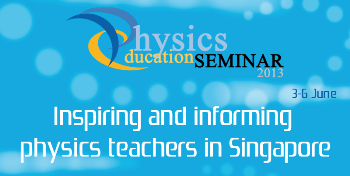Jun 7 2013
More than 100 physics teachers attended Singapore's Physics Education Seminar (PES), held 3-6 June at NUS High School of Mathematics and Science. The event offered professional development: a day-long seminar of talks and tours was followed by two workshops on teaching resources developed by Canada's Perimeter Institute (PI), a world-renowned research centre in theoretical physics.
 Singapore's Physics Education Seminar was launched as a biennial event in 2011. CQT helped to organise the 2013 conference.
Singapore's Physics Education Seminar was launched as a biennial event in 2011. CQT helped to organise the 2013 conference.
CQT co-organised the event with NUS High School and the Institute of Physics (Singapore), with support from the Ministry of Education, Singapore. The organisers also gratefully acknowledge sponsorship from Singapore's national defence R&D organisation, DSO National Laboratories.
The seminar offered perspectives on careers for science graduates, discussion of teaching methods and a 'learning journey' visit to a company or NUS. Teachers who visited NUS got a peek into CQT's quantum labs.
In the workshops, teachers were introduced to classroom resources developed at PI by educators working in close collaboration with research scientists. The first workshop covered the "Challenge of Quantum Reality" and "Measuring Planck's Constant", the second "The Physics of Innovation" and "Revolutions in Science".
"I'm interested in the teaching strategies. I like the fact that they use the predict-observe -explain method and that I can learn more about the philosophy," says Clifton Soh, a senior teacher at NUS High School who participated in the quantum workshop. "We can have trainers from anywhere, good teaching is the same everywhere."
"Exciting and inspiring! Cutting edge content and pedagogy that blew my mind," said Joanne Ng Li Min from Temasek Junior College.
The quantum-themed workshop introduced the idea of wave-particle duality with simple but assumption-challenging experiments that can easily be conducted in classrooms, building towards discussion of the different — and still debated — interpretations of quantum theory.
Teachers using the quantum resources in their classrooms are welcome to contact CQT's outreach team about opportunities to extend their students' experience and encourage their enthusiasm, such as inviting scientists to your classrooms or bringing students to our centre.